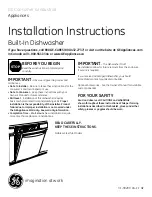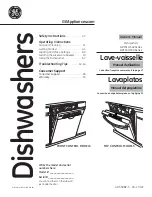
16
Type of racks and loading
•
YELLOW rack: for 18 plates with maximum diameter
of 240 mm.
Figure 14
•
BLUE rack for glasses: the glasses should be placed
upside down.
D4
END OF WORK AND DAILY CLEANING
The appliance is designed to carry out an automatic
cleaning cycle to help flush out any residues and to
guarantee greater health and hygiene:
•
Lift the hood and take out the rack containing the
clean dishes.
•
Remove the tank filter “C” and the overflow “W” to
drain the water from the tank.
Figure 15
•
Close the hood.
•
Select the drain cycle by pressing “B” button
(Figure 13).
The message "CLE" ("CLEAN") will be displayed
throughout the drain cycle:
•
After a few minutes, 3 beeps indicate the end of the
cleaning cycle and “END” blinks on the display:
•
Switch off the dishwasher by pressing “A” button
(Figure 13).
•
Switch unit off at the main circuit breaker.
•
Close the water shutoff valve.
•
Replace the filters and the overflow.
Cleaning the nozzle jets
•
Remove the top and bottom jets “F” and “I”,
unscrewing the ring nut “H”.
Figure 16
•
Unscrew plugs “L” from the rinse jets and clean using
a water spray. Do not use sharp implements to clean
the nozzle holes, which could otherwise be damaged.
Cleaning the filter
•
Remove the filter “E” and clean away any remained
food.
Figure 17
Upon completion of cleaning operations, replace the
parts removed previously.
Cleaning the exterior surfaces
Before carrying out any cleaning operations, turn off the
power at the main circuit breaker.
Clean the stainless steel surfaces using warm soapy
water; never use detergents containing abrasive sub-
stances nor steel scrapers, common wire wool, brushes
W
C
H
F
I
L
C
E




































